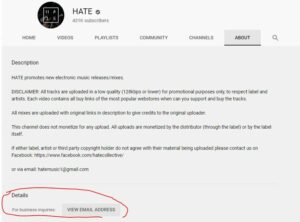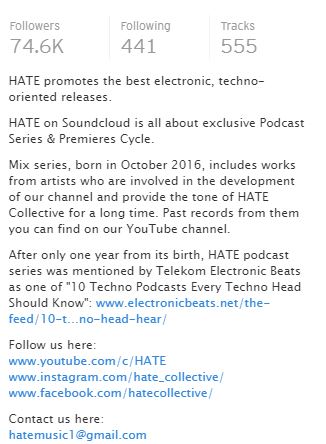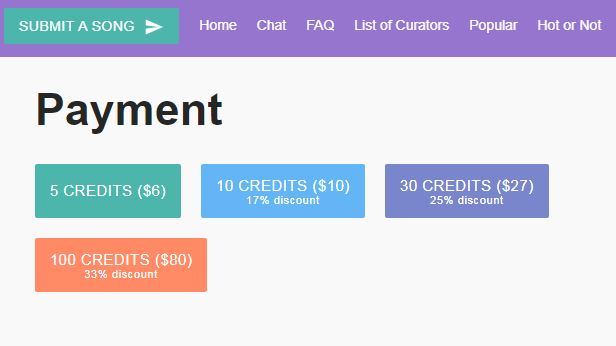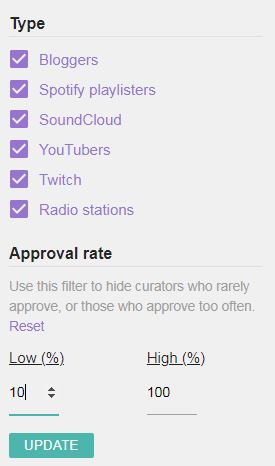How To Release Music During A Pandemic
A question that I commonly get during my mentorship sessions is if it’s different to get signed to a label during the pandemic, or if it’s the same. The answer is yes to both, but with some caveats. These are some of the best ways for how to release music during a pandemic.
The best way to get signed to a label is through networking, rather than cold submission, pandemic or not. Over the years of running Archipel, only about 2% of its releases are from cold emails.
That’s because most of the people I sign I have a personal relationship with. And most of these personal relationships were fostered through meeting people at events.
Clearly there aren’t events now.
Another common way that tracks would get signed is DJs would play a track at a club, and label owners like myself would ask what the track was. We would then contact the artist, and see if they wanted to sign to the label.
But alas, clubs aren’t open, and live streams aren’t attended like clubs are. So the chances of an organic signing happening like that are slimmer than it used to be. Sure, it can still happen, especially through DJ mixes, but it’s not the same.
But don’t despair. Just because traditional, organic avenues of track signing are unavailable, doesn’t mean that new avenues haven’t become available.
Strategies For How To Release Music During A Pandemic
How To Release Music During A Pandemic – Things That Don’t Work
Before we get into what does work during a pandemic, let’s cover what doesn’t work. Harking back to emails, like I said before, only 2% of my signees are from them. During a pandemic, this number is significantly reduced due to the sheer volume of people soliciting signings.
Additionally, many labels are reducing the amount of signees, since DJs aren’t buying as many tracks, thus drying up their revenue streams. Plus, if they release on physical formats such as vinyl, or cassette, many of these factories are operating on reduced staff for health reasons. This delays releases, and increasing the cost of these mediums.
This makes labels even pickier about the stuff that they sign, considering that it will ultimately net them less revenue.
In other words, unless you are someone they really want to sign, the chances of you getting signed through a cold approach are pretty slim, due to scarcity.
How To Release Music During A Pandemic – Things That Do Work
This doesn’t mean that artists are screwed though. Even with clubs closed, and inboxes inundated, there are both alternative routes to getting signed, as well as new ones that have become available due to the pandemic.
First, lets talk about the alternative routes.
Getting Discovered On YouTube Or SoundCloud
This is a process involves a sacrifice; a sacrifice to the YouTube or SoundCloud gods. There are dozens of sound specific YouTube and SoundCloud channels out there, dedicated to supporting good music. A lot of the time, these channels aren’t concerned about brand recognition, or revenue potential, since they don’t make a lot, or any money off of what they upload. Additionally, the cost to them is only an opportunity one, since it’s free to upload to SoundCloud and YouTube.

If it’s a well curated channel, there will be label owners who frequent it, because first and foremost, label owners are music fans. Secondly, if your track is that good, and they hear it, they may reach out to you to see what else you have.
The track you uploaded won’t be signed usually, but if you make a similar sound, chances are one of your other ones will. Additionally, you will get your track put up on a well trafficked page, so who knows who else will hear it. It could lead to new fans, downloads, etc.
So how to release music during a pandemic on these channels?
Target Your Channels
First, make sure the channel is targeted. If you are making minimal house music, it doesn’t make sense to send it to a drum n bass channel, or vice versa. Not only will you waste your own time putting together the contact info and email, but you will also waste theirs, which increases the chances of your email being flagged as spam. Get enough spam flags, and none of your emails will deliver, even to relevant ones.
A good way to target these channels is to think of a small to mid sized artist that has a similar sound to yours, and then search for them on YouTube or SoundCloud. Then, if you see a channel that has uploaded it, then reach out to them.
Make Sure The Channel Isn’t A Label
Note, that many of the channels that upload these tracks are the labels themselves. Therefore, it doesn’t make sense to contact these, as this is not the goal. Just make sure to pay attention to who you are submitting to.
Example Email
When reaching out to these places, understand that the more popular the channel, the more solicitations they will get. Therefore, keep your messages short, sweet, and relevant.
Hi {channel name or first name of channel owner},
Thanks for supporting smaller artists. It’s people like you who keep good music flowing upwards, and for that, I appreciate you.
I saw that you uploaded {similar artist name}. I just finished this track (link to download enabled track on a private SoundCloud) and I think it has similar vibes, and would work well on {channel name}.
Would you let me know your thoughts on it?
Thanks for giving it a listen!
{Your Name}
{Links to EPK, website, etc.}
See how it’s short, sweet, flattering, and provides all the necessary information. This is a great way for how to release music during a pandemic.

Advertise That It’s Unsigned
If they decide they want to upload it, they will most likely contact you about it to ask for more info. Ask them to stipulate that the track is unsigned and self released in the YouTube description. This will typically be in the section where it says the label name, but instead will read unsigned.
This will signal to potential labels that you’re available, and is a key tactic in how to release music during a pandemic.
You Will Get Thousands Of Listens
Don’t despair if you don’t get signed this way, though. If it’s a popular enough channel, you will get thousands of ears on your track, which in itself is a win. Also, there is nothing from stopping you from submitting to multiple channels as well. They are channels, not labels. You can be on multiple channels with the same song. This is still a solid tactic for how to release music during a pandemic.
Paid Channels
Note, that there are a lot of paid channels. Some are good, some are not so good. The good ones will have a curation process, and won’t accept just anything. If you get a reply back from one soliciting payment for an upload, check their other tracks and see if they are quality. If they are just uploading anything they can make a few dollars off of, then chances are the engagement you are seeing is fake since who wants to engage with bad quality stuff?
SubmitHub
Some people may be familiar with SubmitHub as well. It is a common channel people would use for how to release music during a pandemic, or not.
If you’re not familiar, SubmitHub is a place where you can pay a small fee to solicit a listen from a blog. If they like it, they may upload it. However, you only pay for a listen, not an upload.
SubmitHub is a decent route for how to release music during a pandemic, if you have really good stuff. But make sure 1) your stuff is relevant and 2) they have a decent acceptance rate. If they only have a 1 or 2% acceptance rate, that’s a similar chance of your stuff getting signed from a cold email to a label, so you might as well just go to the label directly instead of doing this roundabout way. Look for channels that accept at least 10% of submissions.


Networking, Pandemic Style
The next way to get signed is through referral, or through meeting the label head directly. While it will be less personal than meeting them in person, while under the positive influence of the club, and it’s many vices, there are still ways to achieve a similar goal using things like social media. These methods are one of the more sure fire ways for how to release music during a pandemic.
Reaching Out To DJs/Producers For A Referral
While in the past, DJs would have been on tour, and thus less responsive to messages online, in this current environment, they’re all home. That is, unless they’re playing Tulum and killing someone’s abuela for clout.
But for the non-selfish DJs, most are sitting home, or in the studio, not doing much, just like everyone else. Therefore, they are more likely to respond to messages. That means they are more likely to respond to your message. If done tactfully, you can turn this message into a referral to a label that they are on.
One of the best ways to get noticed by someone is to ask for their advice about something. People like to be appreciated for their expertise, and since they have time, they are willing to give it out.
However, just like in Pheek’s Coaching Corner, if you’re going to ask them for advice, make it specific. Don’t just ask them what they think of the track. Ask them specific things, like parts of the mix, what they think of the bridge, or a specific tone you use. Ask them how they would improve it, or if they think it’s good as it is.
If they have advice, modify the track using it, and then send it back to them for a follow up opinion, which, if they helped you the first time, they’re likely to help you again.

Proposing To Them
Once you get it to a point where they are excited about the track, you can drop, “In your opinion, do you think it would work well on {insert label} if I sent it over to them?” They would hopefully give you a yes, or no answer. If it’s a no, maybe ask them the reason, and what you can do in order to improve your odds.
Don’t take it personally, sometimes labels are just not signing new artists, or they only sign artists within a certain social circle.
If it’s a yes, almost apologetically, ask if they would make an intro for you, or allow you to use their seal of approval in the email you send over to the label. This will go a long way in proving to the label that you’re just not another submitter, but rather someone who is part of the inner circle. Getting them to agree to feedback, or an introduction, will one of the best recommendations I can make in regards to how to release music during a pandemic.
Reaching Out To Labels For Advice
This same approach can be taken for labels. While, it’s not recommended that you send them your track right away for them to provide feedback on, maybe hit them up with a, “Hey, I love your label {briefly talk about what you like about it]. I’m an artist who’s trying to learn the ways of the world, and I was curious, what’s the best way to approach a label like yours? Do you recommend just submitting it cold, or is there a better way?”
This way, you’re asking for their feedback, not necessarily submitting a track. If you’re able to build solid rapport with them, then ask if they will check out your track. Worst they say is no, and you will have learned a valuable lesson about how to approach labels, and made a good industry connection that you can call on, assuming you keep rapport with them.
A piece of advice before reaching out to anyone though – make sure to interact with their content beforehand so that you show that you’re a real fan, and not just someone who wants something. For a couple months, like, and comment on their posts so that they recognize your name when you eventually reach out to them. This will warm the water a little bit, and make them far more receptive.
How To Release Music During A Pandemic – Other Channels
Join A Group
For instance, Pheek’s Coaching Corner. There are tons of label owners on there, and if you stay active on there, and upload your tracks for advice, there is a good chance a label owner listens to it, and reaches out to you if they like it. There are tons of groups like this for their respective genre, on Facebook, and Discord. You can also ask these groups about how to release music during a pandemic.
Join A Class
There are tons of producers who are hosting online classes. For instance, Justin Jay currently teaches a group of students, and he recently released a class compilation on his label. They may even cover how to release music during a pandemic.
Start A Blog
You’d be surprised how easy it is to get an artist to give you an interview, especially nowadays. If you target your blog to a specific topic that isn’t well covered, then you can build an audience around that niche.
Another good thing to do is to just create a Facebook page where you do video podcasts and upload them to Facebook. Once you upload them to Facebook video, you can share them in relevant groups, and each 3 second view counts as a view. This way, you can show some good stats to potential interviewees, and show that it won’t fall on deaf ears.
You can then upload your videos to YouTube as well, and start a YouTube channel with the interviews.
This method is valuable because not only do you get an introduction, but you also provide them value, which begets reciprocity. And reciprocity is a great “how” for how to release music during a pandemic.
Contribute To An Established Blog
If you’re a good writer, many of these blogs are looking for people to contribute and add new content. Many don’t pay, however, the amount of value you can get from these is worth the money, as it gives you access to people you normally wouldn’t have access to.
Also, this way you don’t have to build your own blog, and are instead using the position of something already established to garnish interviews.
However, I would not recommend a quid pro quo, where they get an interview for signing or listening to your track. This can come off wrong, and runs the risk of the blog you write for dismissing you as a writer.
Instead, after you publish the interview, ask them if they wouldn’t mind answering some questions for you and/or giving you feedback.
Start Your Own YouTube or SoundCloud
This is similar to the method we talked about before, where you get discovered on a YouTube or SoundCloud channel, but kind of in reverse. Now, the labels come to you. And if you curate the channel with a sound that is similar to yours, the labels that will come to you are targeted.
Since it’s your channel, you can set up whatever terms you want for them getting their track on your site.
This will obviously take time to build to a point where it’s viable, but once it’s established, you will have a constant stream of labels that you wanted to sign to reaching out to you, instead of vice versa. You will also have a channel to premiere your own music on, if you chose to.
Start Your Own Label
Similar to starting your own YouTube or SoundCloud channel, this makes it so the people you want come to you, in a sense. At first, you will have to build a base of releases. These can be from friends, or small producers looking for any label to sign to (some small producers just like to collect labels).
Then, once you have a dozen or so releases, you can start reaching out to smaller artists on labels that you want to be on, or labels that are related to labels you want to be on. Then you sign those people, and continue to trade up, until you start signing more established artists.
Use Torrents
Another route is to use Soulseek. Soulseek is a private bittorrent network where people share music. Many of the people on Soulseek are the types of people who just need to own everything, so by putting your stuff on there, there is a chance that it will get picked up by someone, and disseminated organically. Once again, no guarantees, but it doesn’t take a lot of effort to put your stuff out there.
Some Final Thoughts On How to release music during a pandemic
These are just some of the creative ways to get on a label during the pandemic. Most of these techniques work at any time during history, but are made more available due to people just having more time.
When the world gets going, DJs and labels are going to be less enthusiastic about responding to all the messages they get from fans over social media.
Additionally, people aren’t going to have the same amount of time, and thus desire, to start blogging, or start their own label, or even take classes. Therefore, there is no better time than now to seize the day. History has given creatives a silver lining; we might as well mine its ore while the getting is good.
Hopefully you got some value out of this article on how to release music during a pandemic.

